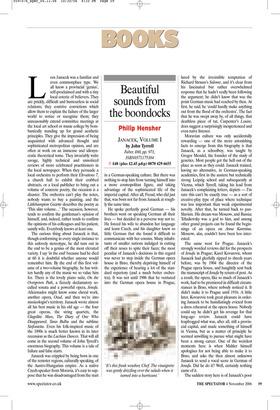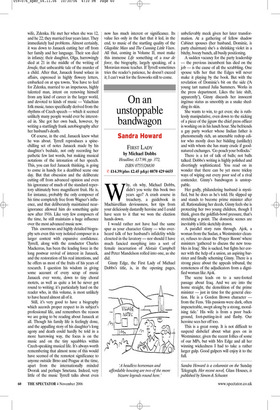Beautiful sounds from the boondocks
Philip Hensher
JANACEK, VOLUME I by John Tyrrell Faber, £60, pp. 971, ISBN0571175384 ✆ £48 (plus £2.45 p&p) 0870 429 6655 Leos Janacek was a familiar and even commonplace type. We all know a provincial ‘genius’, self-proclaimed and with a tiny local coterie of believers. They are prickly, difficult and humourless in social relations; they contrive convictions which allow them to explain the failure of the larger world to notice or recognise them; they unreasonably extend committee meetings at the local art school or music college by bombastically standing up for grand aesthetic principles. They give the impression of being acquainted with advanced thought and sophisticated metropolitan opinion, and are often at work on an immense and idiosyncratic theoretical tome. They invariably write savage, highly technical and unnoticed reviews of more celebrated practitioners in the local newspaper. When they persuade a local orchestra to perform their Elevations 7, a church hall to exhibit their crabbed abstracts, or a local publisher to bring out a volume of concrete poetry, the occasion is a disaster. The orchestra can’t play the notes, nobody wants to buy a painting, and the Littlehampton Gazette describes the poetry as ‘This slim volume...’ The occasion, however, tends to confirm the gentleman’s opinion of himself, and, indeed, rather tends to confirm the opinions of his colleagues and his patient, saintly wife. Everybody knows at least one.
The curious thing about Janacek is that, though conforming in every single instance to this unlovely stereotype, he did turn out in the end to be a genius of the most elevated variety. I say ‘in the end’ because had he died at 60 it is doubtful whether anyone would remember him. By the end of this first volume of a two-volume biography, he has written hardly any of the music we so value him for. There is the lovely piano suite, On the Overgrown Path, a fiercely declamatory socalled sonata and a powerful opera, Jenufa. Aficionados might know some choral work, another opera, Osud, and then we’re into musicologist’s territory. Janacek wrote almost all his best music in his old age — the four great operas, the string quartets, the Glagolitic Mass, The Diary of One Who Disappeared, Taras Bulba and the sublime Sinfonietta. Even his folk-inspired music of the 1890s is much better known in its later recension as the Lachian Dances. That will all come in the second volume of John Tyrrell’s enormous biography. This volume is a tale of failure and false starts.
Janacek was crippled by being born in one of the remoter regions, culturally speaking, of the Austro-Hungarian empire. As a native Czech-speaker from Moravia, it’s easy to suppose that he was disadvantaged from the start in a German-speaking culture. But there was nothing to stop him from turning himself into a more cosmopolitan figure, and taking advantage of the sophisticated life of the imperial capital. After all, Freud, who did just that, was born not far from Janacek at roughly the same time.
He spoke perfectly good German — his brothers went on speaking German all their lives — but decided in a perverse way not to. He forced his wife to abandon her language and learn Czech, and his daughter knew so little German that she found it difficult to communicate with her cousins. Many inhabitants of smaller nations indulged in cutting off their noses to spite their faces; the most peculiar of Janacek’s decisions in this regard was never to step inside the German opera house in Brno, thereby depriving himself of the experience of hearing a lot of the standard repertory (and a much better orchestra). It was not until 1906 that he ventured into the German opera house in Prague, lured by the irresistible temptation of Richard Strauss’s Salome, and it’s clear from his fascinated but rather overwhelmed response that he hadn’t really been following the argument; he didn’t know that was the point German music had reached by then. At first, he said, he ‘could hardly make anything out from the flood of the orchestra’. The fact that he was swept away by, of all things, that deathless piece of tat, Carpenter’s Louise, does suggest a surprisingly inexperienced and even naive listener.
Moravian culture was only accidentally rewarding — one of the more astonishing facts to emerge from this biography is that Janacek, as a schoolboy, was taught by Gregor Mendel, the founder of the study of genetics. Most people got the hell out of the place as soon as they could. Janacek trained, having no alternative, in German-speaking academies, first in the austere but technically strong Leipzig school and subsequently at Vienna, which Tyrrell, taking his lead from Janacek’s complaining letters, depicts — I’m sure this can’t be exactly true — as a sort of creative-play type of place where technique was less important than weak experimental novelty. After that, he turned back to panSlavism. His dream was Moscow, and Russia; Tchaikovsky was a god to him, and among other grand projects can be found the beginnings of an opera on Anna Karenina. Moscow, alas, couldn’t have been less interested.
The same went for Prague. Janacek’s strongly worded reviews did for the prospects of Jenufa in Prague; Karel Kovarovic, whom Janacek had gleefully ripped to shreds years before, was by 1904 the director of the Prague opera house, and haughtily sent back the manuscript of Jenufa by return of post. As a result, the opera, like so much of Janacek’s work, had to be premiered in difficult circumstances in Brno, where nobody noticed it. It didn’t make it to Prague until 1916. A little later, Kovarovic took great pleasure in ordering Janacek to be humiliatingly evicted from a dress rehearsal at the opera house. Nobody could say he didn’t get his revenge for that long-ago review. Janacek could have leapfrogged what was, after all, still a provincial capital, and made something of himself in Vienna, but as a matter of principle he seemed unwilling to pursue what might have been a strong career. One of the weirdest moments here is when Mahler himself apologises for not being able to make it to Brno, and asks the then almost unknown Janacek to send a vocal score in German of Jenufa. Did he do it? Well, certainly nothing came of it.
The saddest story here is of Janacek’s poor wife, 7.denka. He met her when she was 12, and he 22; they married four years later. They immediately had problems. Almost certainly, it was down to Janacek cutting her off from her family and her language. Their son died in infancy; their daughter, Olga, harrowingly died at 21 in the middle of the writing of Jenufa, that unbearable tale of the murder of a child. After that, Janacek found solace in affairs, expressed in highly flowery letters, embarked on at spa towns. You have to feel for 7.denka, married to an impetuous, highly talented man, intent on removing himself from any kind of career in the larger world, and devoted to kinds of music — Valachian folk music, tunes specifically derived from the rhythms of Czech speech — which it seemed unlikely many people would ever be interested in. She got her own back, however, by writing a startlingly frank autobiography after her husband’s death.
Of course, in the end, Janacek knew what he was about. Tyrrell reproduces a spinechilling set of notes Janacek made by his daughter’s bedside, not only recording her pathetic few last words, but making musical notations of the intonation of her speech. This, you can feel Janacek thinking, is going to come in handy for a deathbed scene one day. But that obsession and the deliberate cutting off from advanced opinion and even his ignorance of much of the standard repertory ultimately bore magnificent fruit. He is, for instance, probably the only composer of his time completely free from Wagner’s influence, and that deliberately maintained nearignorance allowed him do something quite new after 1916. Like very few composers of the time, he still maintains a huge influence over the most advanced music now.
This enormous and highly detailed biography sets even this very isolated composer in a larger context with expansive confidence. Tyrrell, along with the conductor Charles Mackerras, has been the leading force in the long postwar revival of interest in Janacek, and the restoration of his real intentions, and he offers us most of the fruits of his years of research. I question his wisdom in giving some account of every scrap of music Janacek ever wrote, down to tiny choral motets, as well as quite a lot he never got round to writing; it’s particularly hard on the reader who, in this volume, is most unlikely to have heard almost all of it.
Still, it’s very good to have a biography which accords proper respect to its subject’s professional life, and remembers the reason we are going to be reading about Janacek at all. Though his family life is feelingly done, and the appalling story of his daughter’s long agony and death could hardly be told in a more harrowing way, the focus is on the music and on the tiny squabbles within Czech-speaking musical life. It’s always worth remembering that almost none of this would have seemed of the remotest significance to anyone outside Brno and Prague at the time, apart from the internationally minded Dvorak and perhaps Smetana. Indeed, very little of the music Tyrrell talks about even now has much interest or significance. Its value lies only in the fact that it led, in the end, to music of the startling quality of the Glagolitic Mass and The Cunning Little Vixen. All that, coming in Volume II, must make this immense Life something of a tour de force, the biography, largely speaking, of a Moravian music teacher. If Tyrrell sometimes tries the reader’s patience, he doesn’t exceed it; I can’t wait for the fireworks still to come.



















































































































 Previous page
Previous page